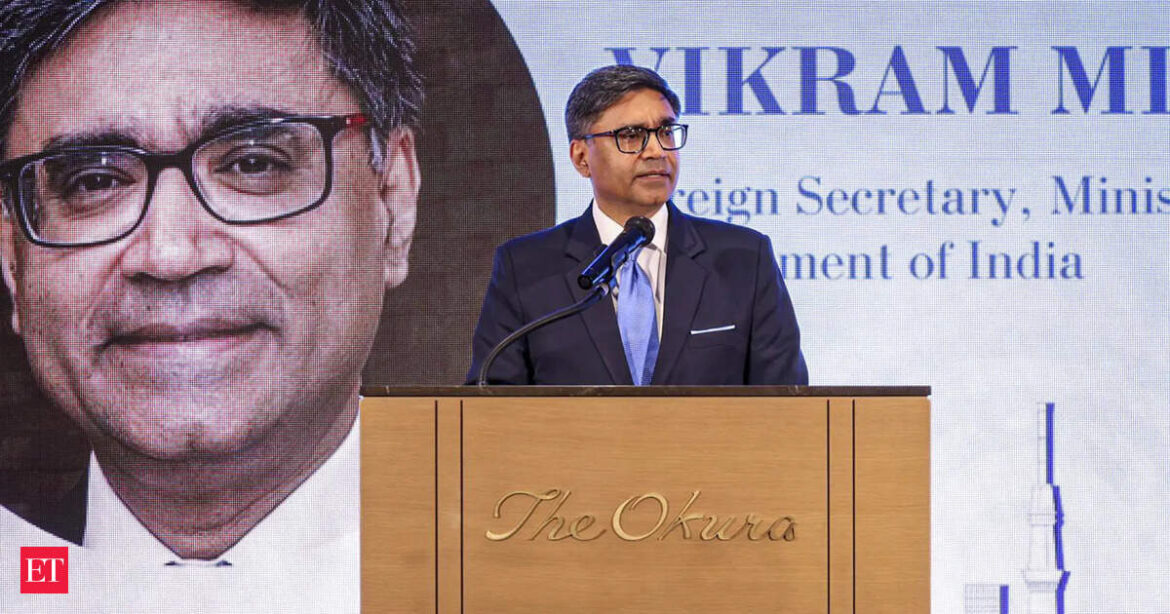Underlining that terrorism doesn’t distinguish and impacts everybody, Foreign Secretary Vikram Misri on Thursday said that it was important not to equate the victim and the perpetrator of terror attacks. Speaking at Raisina Tokyo 2025 here, Misri appreciated the support extended to India by Japan following the terror attack in Pahalgam on April 22 that killed 26 people.
“India is deeply appreciative of the support that is being extended by Japan, as we have dealt with the tragedy that took place on the 22nd of April in Pahalgam, Jammu and Kashmir in India,” he said.
“While I welcome these statements, I also want to note for everybody’s consideration that as we deal with the scourge that is terrorism that doesn’t distinguish and that impacts everybody in the world from time to time, it is important that we don’t equate the victim and the perpetrator of these attacks,” he said.
His comments came against the backdrop of some Western countries hyphenating India and Pakistan in the context of their recent military confrontation.
In response to the Pahalgam attack, India carried out precision strikes on terror infrastructure in Pakistan and Pakistan-occupied Kashmir in the early hours of May 7, following which Pakistan attempted to attack Indian military bases on May 8, 9 and 10. The Indian side responded strongly to the Pakistani actions and attacked air bases.
 Live Events
Live Events
India is sending multi-party delegations to world capitals to reach out to the international community on Pakistan’s designs and India’s response to terror. Talking about the global economy, Misri said that after a smooth ride spanning decades, it is finding itself in somewhat uncharted waters with uncertainties at their highest in recent memory. “First came the tremor of the COVID-19 pandemic. On its heels, came the supply chain aftershocks, wars and conflicts, big, middling and small followed, and amid all this, trade and technology are being weaponised as never before,” he said.
In a turbulent world, India is determined to become a fact and a factor of stability, Misri said, adding that India’s ability to maintain a stable macroeconomic outlook, demonstrate political and institutional stability, uphold democratic values, and contribute to global public good and multilateral problem-solving gives it both credibility and agency.
“Located at the geographic, demographic and economic heart of Asia, India’s choices will have ever more important consequences for our continent and beyond in these tumultuous times,” he added.
With a 1.4 billion strong population, India continues to be an attractive destination for global capital, he said.
India has made a strategic shift towards manufacturing-led growth to position itself as a vital node in global supply chains in recent years, Misri said, referring to ‘The Make in India initiatives’ which continue to foster investment in areas such as electronics, defence, pharmaceutical, and textiles manufacturing.
The Production Linked Incentive Scheme, covering 14 key sectors, is projected to attract USD 520 billion in investment, and counts over two dozen Japanese companies among its beneficiaries, he added.
As the fourth-largest vehicle producer in the world, India is accelerating its shift to electric vehicles through targeted policy support such as the FAME-II scheme and incentives for battery manufacturing, he said, adding that this is an opportunity to re-create the India-Japan success of Maruti-Suzuki in the new age.
To spur domestic and global capital, India has undertaken far-reaching reforms that foster a transparent, efficient, and predictable business environment, he said.
Noting that the Indian Railways is undergoing rapid modernization, he said Japan has been India’s preferred partner in urban mobility.
He added that India plans to operate over 200 airports by 2040, supported by integrated logistics parks that improve last-mile freight movement.
With its strategic focus on manufacturing, digital empowerment, infrastructure, and global engagement, India is not only future-ready-it is shaping that future, he said.
“As the world reconfigures supply chains and reinvents global collaboration to deal with turbulence, the Special Strategic and Global Partnership between India and Japan can emerge as one of the most significant relationships in the 21st century, not only for its economic promise but also for the close alignment on principles — such as strengthening the rules-based order, strategic autonomy, and sustainable growth,” he said.
He said India encourages Japanese businesses to diversify the trade basket with India by expanding into new sectors such as digital services, renewable energy, critical minerals and semiconductors.
“A broader trade engagement across sectors will not only unlock new business potential but also enhance economic stability, reduce over-dependence on concentrated markets, ensure supply chain resilience and strengthen long-term economic security for both India and Japan,” he said.
He said both India and Japan are witnessing profound uncertainties as globalization enters a new phase, but India has the confidence to make it work for both countries.
“We believe we are fundamentally and structurally well-placed to navigate this phase in partnership with Japan, rather than in competition. The challenge before us – for governments and businesses alike — is to wake up to these opportunities of a new day,” he added.


AloJapan.com